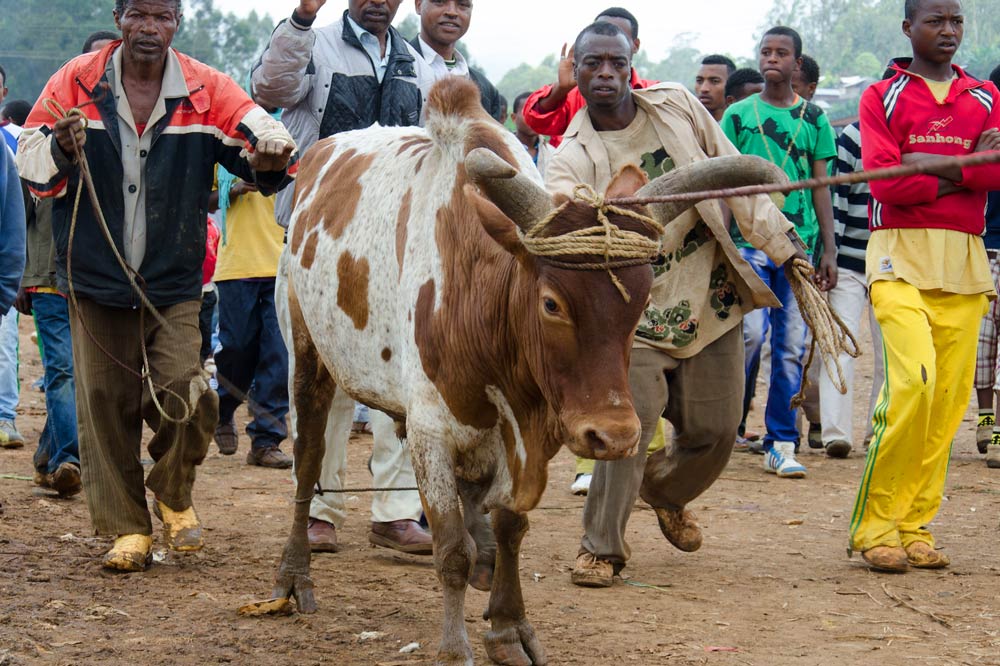
In Uganda’s Eastern hills of Bududa, a cultural event second only to Imbalu—the traditional circumcision ceremony of the Bagisu—comes alive every other Saturday. This hidden gem of tradition remains largely unknown to the rest of the country.
Ask the average Ugandan what they know about Bududa, and the majority are bound to tell you landslides. Yet, hidden within this lush, picturesque region is a gem of a tradition dating back to the 1950s: Bullfighting in Eastern Uganda. Passed down through generations, this unique custom deserves more attention on both mainstream and social media.
Local history has it that way before bullfights, grievances between men were resolved by wrestling and duels with spears, and submission by the losing opponent was the only way for it to come to an end. The locals would gather to watch this brutality and gain a taste for it.
Although killing was not an option, far too many grievous injuries were registered, often. With the arrival of the colonialists, these notorious duels came to an end. Bududa exclusively hosts adrenaline-packed Bullfighting spectacles that have entertained and enthralled the local communities for decades.
On match day, bull keepers undertake long treks of varying miles from different villages, accompanied by their formidable charges. En route to the battleground, enthusiastic chants and cheers punctuate the air. Strategic stops at Riverbanks along the way grant the bullkeepers an opportunity to wash their bulls before they get to the fighting grounds.
Notably, these bulls appear conditioned to recognise the imminent clash, their excitement peaking as they near the arena. Yet, amidst the electrifying atmosphere, they display disciplined restraint, never attacking their human escorts or spectators.
You have to attend in person to know the magnitude of the event. With spectators tipping slightly over the one-thousand mark, the excitement in the air is tangible.
It is noteworthy that the bullfighting activity motivates the locals to spend their time productively, as they raise and train these bulls right from when they are calves up until they are ready to fight and bring pride and prize, both financial and otherwise, to their owners.
Related Stories: Gen. Muhoozi Kainerugaba is Back on X Just a Week After Departure
Related Stories: What are Ugandans Known for? Hospitality, Culture, Food, and…
This process takes between four to six years and involves dedicated training and a special diet for future gladiators. Inclusive in this diet is Kamasifwa (which is a residue of a local brew—Malwa) and banana stems. It is believed that this is the origin of the bulls’ aggressive temperament.
As the festival gains momentum and the contesting bulls of different sizes get onto the battleground under the vigilant watch of their keepers, the crowds watch with anticipation from the trees surrounding the field.
What began over seven decades ago as a fun pastime for local herdsmen, who would let their bulls battle to mate when the cows were on heat, swiftly rose to explode as the number one recreation with the coming onto the scene of a super-aggressive young bull owned by Kundu, that subdued every bull that it battled.
The situation on the field gets tense when the first two big bulls are led to the ground to face each other, and people surround the action and cheer on. The bulls lock horns, and a show of strength is displayed as they push back and forth, with the owners lashing their bulls to force them back into the fight at the first sign of cowardice.
Related Stories: Elon Musk Amplifies ‘Janice Nkajja Viral Video’ on Corrupt & Extravagant Uganda Amid USAID Freeze
Related Stories: Top 5 Digital Payment Systems in Uganda
There are no breaks once the fight gets underway, and if the losing bull dies as a result of the battle, there is no cause of action against the owner of the winning bull.
The fight is called off when the losing bull runs off or is knocked out, literally. The bulls display different strategies of attack, depending on how they were trained.
Several tour companies offer packages that include a trip to Mbale, mostly to visit Sipi Falls. Including a detour to Bududa to watch a Bullfight would be an added attraction for tourists, both local and international.
Bullfighting in Bududa offers a unique cultural experience, showcasing the region’s rich heritage and traditional practices. The tradition not only highlights the skill and bravery of local bullfighters but also presents an opportunity for cultural exchange and economic growth through tourism. By incorporating bullfighting into existing tour packages, visitors can gain a deeper appreciation for Uganda’s diverse traditions and contribute to the local economy. As a testament to the nation’s vibrant cultural identity, Bududa’s bullfighting legacy endures, inviting exploration and discovery.
Related Stories: Digital Number Plates in Uganda: How they work, costs, & 2025 Rollout
Related Stories: Kiira Motors – Electric Vehicles Manufacturing in Uganda
2 thoughts on “Bullfighting in Eastern Uganda – Bududa’s Thrilling Gem”
We have bullfights in Uganda? Damn, I should move out more 😂.
Oh yes Enoch, you should. Visit Mbale.